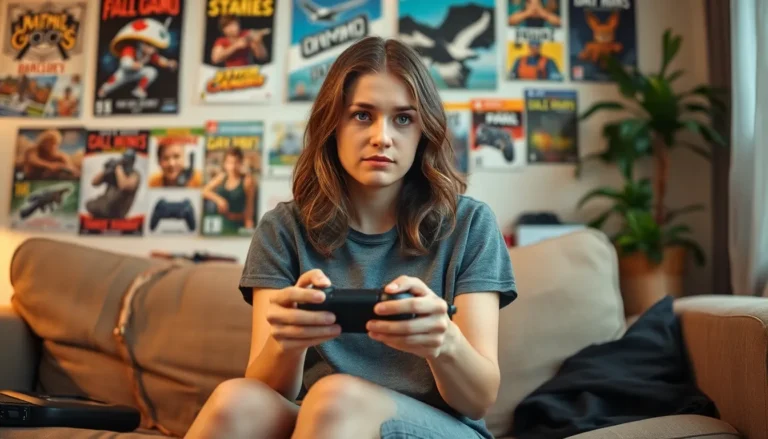Table of Contents
ToggleIn a world where pixels and power-ups reign supreme, it’s easy to lose track of time—and reality. Game Overdertoza might have seemed like a harmless escape, but now it feels more like a digital black hole sucking away precious hours of life. If the thought of a “game over” sends shivers down your spine, it’s time to hit the reset button.
Understanding Game Overdertoza Addiction
Game Overdertoza addiction involves compulsive gaming behavior that disrupts daily life. This form of addiction can transform a pastime into an obsession, leading individuals to prioritize gaming over responsibilities and relationships.
What Is Game Overdertoza?
Game Overdertoza is an engaging and immersive video game known for its captivating graphics and dynamic gameplay. Many players find themselves drawn into its complex narratives and challenging levels. Initially appealing, the game promotes extended gameplay sessions, which can lead to an unhealthy preoccupation with game objectives and achievements. Individual enjoyment may quickly shift from leisure to a compulsive need, impacting various aspects of life.
Signs and Symptoms of Addiction
Identifying game Overdertoza addiction requires awareness of several key signs. Notable symptoms include neglecting responsibilities, withdrawing from social interactions, and feeling restless when unable to play. Players may frequently think about the game or feel an intense urge to continue gaming despite negative consequences. Increased time spent gaming can lead to deterioration in personal relationships, work performance, and mental health. Recognizing these signs early can help in addressing the addiction effectively.
Assessing Your Situation

Assessing one’s gaming habits requires a clear understanding of their impact. He or she must evaluate how much time is spent playing “Game Overdertoza” compared to other activities. A person may notice declining productivity at work or school. Relationships might strain due to neglecting important social interactions. Monitoring emotional reactions, such as irritation when unable to play, provides additional insight. Taking note of these aspects can reveal how gaming behaviors influence daily life.
Recognizing the Impact on Your Life
Identifying the signs of excessive gaming plays a crucial role in addressing addiction. Difficulty maintaining relationships may surface as gaming takes priority over social activities. Noticeable changes in mood often occur, with irritability or anxiety when not engaging in gameplay. Responsibilities, including work, chores, or studies, might get pushed aside for game time. Losing interest in hobbies outside gaming can signal a growing dependence. Evaluating these changes helps paint a clearer picture of gaming’s effects on life.
Determining the Severity of Addiction
Determining addiction severity involves reflecting on gaming habits and their consequences. Acknowledging time spent gaming each day provides a reality check. Consider whether gaming interferes with sleep, health, or relationships. An individual may realize that their gaming time has escalated, leading to negative outcomes in other areas. Assess frequency, duration, and emotional responses when trying to disconnect. A pattern of prioritizing gaming over essential commitments typically indicates a more serious problem.
Strategies for Overcoming Addiction
Effective strategies can help individuals overcome Game Overdertoza addiction and regain control over their lives. Implementing structured approaches may yield significant benefits.
Setting Clear Goals
Establishing clear goals serves as a foundation for recovery. Short-term objectives might include reducing daily gaming time by 30 minutes or completing one non-gaming activity per day. Long-term goals could focus on reconnecting with friends or returning to hobbies once enjoyed. Tracking progress fosters accountability and motivation. Rewarding oneself for achieving these targets reinforces positive behavior. By breaking down objectives into manageable steps, individuals can systematically address their gaming habits and reduce the grip of addiction.
Finding Alternative Activities
Exploring alternative activities can divert focus from gaming. Engaging in physical exercise, such as jogging or joining a sports team, often enhances mood and fosters social connections. Consider picking up new hobbies like painting, cooking, or reading to stimulate creativity and increase satisfaction. Participating in community events or volunteering may also provide a sense of purpose and fulfillment. Drawing from interests outside gaming encourages a balanced lifestyle while cultivating new skills and relationships. By filling time with enriching activities, the hold of gaming diminishes, paving the way for healthier habits.
Seeking Support
Seeking support is essential for overcoming Game Overdertoza addiction. Several resources can aid individuals in their journey to regain control.
The Role of Friends and Family
Friends and family play a crucial role in the recovery process. They can offer encouragement and understanding, helping individuals identify triggers and develop healthier habits. Engaging loved ones in open conversations about gaming behavior fosters accountability. Inviting them to participate in alternative activities, such as sports or movie nights, strengthens social bonds while reducing gaming time. Their support provides individuals with a safety net, making it easier to navigate challenges and celebrate successes in reducing gaming habits.
Professional Help and Therapy Options
Professional help can be a valuable resource for overcoming gaming addiction. Various therapy options, including cognitive-behavioral therapy (CBT), focus on modifying unhealthy thought patterns associated with gaming. Specialists trained in addiction treatment can provide tailored support for individuals struggling with Game Overdertoza. Group therapy also creates a communal space for sharing experiences and coping strategies. Individuals seeking professional guidance often find motivation to explore underlying issues contributing to their gaming habits. Seeking help ensures access to effective strategies and tools, empowering individuals on their path to recovery.
Maintaining Long-Term Recovery
Maintaining long-term recovery from Game Overdertoza addiction requires a focus on healthy habits and accountability.
Developing Healthy Habits
Incorporating healthy habits aids in rebuilding life outside gaming. Engaging in regular physical activity, such as jogging or yoga promotes physical well-being while reducing stress. Exploring new hobbies encourages creativity and distracts from gaming urges. Cultivating positive social interactions can restore valuable relationships often overshadowed by gaming. Meal planning and preparation contribute to better nutrition, enhancing focus and energy. Establishing a balanced daily routine reinforces structure, making it easier to resist gaming temptations. Mindfulness practices, including meditation, sharpen awareness of triggers and emotional responses, further supporting recovery. Opting for educational pursuits stimulates the mind, offering fulfilling alternatives to gaming.
Staying Accountable
Staying accountable enhances the recovery journey by fostering commitment. Sharing progress with friends or family promotes encouragement and motivation. Setting specific goals, like limiting gaming hours or increasing engagement in non-gaming activities, creates measurable benchmarks. Joining support groups can provide invaluable resources and connection with others facing similar challenges. Tracking daily habits in a journal reinforces personal awareness and highlights areas for improvement. Regularly assessing feelings about gaming helps identify emotional triggers. Encouraging open conversations about gaming habits cultivates understanding and support within relationships. Seeking professional help, such as therapy, can provide additional resources tailored to individual circumstances.
Overcoming Game Overdertoza addiction requires a proactive approach and commitment to change. By recognizing the signs of excessive gaming and evaluating its impact on life, individuals can take the first steps toward recovery. Setting clear goals and finding alternative activities can help redirect focus and foster a balanced lifestyle.
Engaging with friends and family for support creates a strong network that encourages accountability. Seeking professional help can also provide tailored strategies for managing gaming habits. With dedication and the right tools, it’s possible to regain control and enjoy a fulfilling life beyond the screen.




